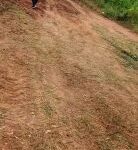“I will restore the fortunes of my people Israel, and they shall rebuild the ruined cities and inhabit them; they shall plant vineyards and drink their wine, and they shall make gardens and eat their fruit. I will plant them on their land, and they shall never again be uprooted out of the land that I have given them,” says the Lord in Amos 9:14-15.
On Sunday, November 13, 2022, thanks to LITINA Tours Ltd, I landed in Tel Aviv with about 40 fellow Ghanaians ready to walk in the footsteps of Christ and strengthen my faith.

Israel is no doubt a blessed land but what impressed me most beyond my visits to the sacred sites was how quickly I was initiated into seeing the fact that the country is an agricultural powerhouse.
A fact observed not too far from the main airport, the Ben-Gurion International Airport.
We know of Israel of the Bible, but I was astounded by the Israel of agriculture, especially when I knew that more than half of the land is a desert. Much of the soil is of poor quality with very few natural water resources, how did it become a world leader in agriculture?
It began with the government. Further reading revealed, the country’s government very early on embraced agriculture as a national mission. This was reflected even in the composition of the government. Israel’s first prime minister, David Ben-Gurion was a farmer and so was half of his cabinet. Such strong leadership from the top set the tone for agricultural development in four ways.
1. A leadership that owned its national mission.
2. Clear policies and programmes to support the farmer
3. Policy consistency and continuity
4. Effective prioritisation, planning, and coordination.
Today, Israel grows and exports citrus, avocado, dates, and other fruits and vegetables.
Records show that in 2018, Israel exported $350 million worth of vegetables, $250 million worth of dates, avocados, and mangoes, $215 million worth of fruit juices, $193 million worth of citrus fruits, $188 million worth of processed food and $151 million worth of seeds, from a country that only has 295,000 hectares of arable land. To put this in perspective, that is only 6.2% of Ghana’s 4.7 million hectares of arable land.
The country also leads in post-harvest handling: it records 0.5 per cent of grain storage loss, compared to 20 per cent worldwide.

My visit, though too short, took me to the Sea of Galilee, a breathtakingly precious freshwater lake where Jesus walked on the water after calming the storm.

Here, Jesus also ministered many times and his disciples worshipped Him and we did too!
Interestingly the Sea of Galilee is the main freshwater source for Israel.

Jericho – The city of Palms
Known as the oldest existing city in the world. The first city captured by the Israelites as they entered the Promised Land.


There were also people putting up a Christmas tree ahead of the festivities.
The eastern gate, Golden Gate, the Beautiful Gate, on the Mount of Olives where Christ is believed to have ascended to heaven.
I am very grateful to LITINA Tours and all the lovely people I met on this unforgettable visit to the Holy Land where places in the Bible come alive.
The biggest truth from this visit is that Jesus is Alive!







